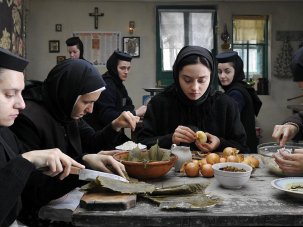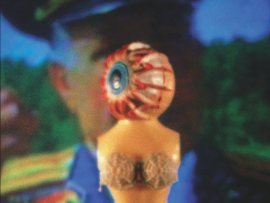Festival blog | Web exclusive
Everybody in Our Family
Reaching the difficult age of 11 – no longer a child, not quite a teenager – the Transilvania International Film Festival’s 2012 edition mixed continuing success with a hint of unease. The programme was as strong as ever, bearing the unmistakable stamp of its artistic director Mihai Chirilov and boasting, appropriately enough, an 11 per cent increase in ticket sales.
Since I first went in 2004, TIFF has changed almost as much as Cluj itself, and can now count itself as one of the top five film festivals in Eastern and Central Europe. Very sensibly, it has held the industry at arm’s length: yes, there are panels and masterclasses, but they’re about film, not money.
Not that everything is rosy in the Romanian film garden: public funding is as limited as ever, despite the international success of the Romanian New Wave, tales of corruption and cronyism still pepper any conversation with a Romanian producer, and financial support from Germany, the Netherlands and above all France is almost a prerequisite for making a film.
But TIFF’s greatest strength is its audience, anchored by the local university but drawn from all over a country whose film distribution system has failed to keep up with the production boom. Despite much building of multiplexes, Romania is still Europe’s most under-screened territory, with just 241 screens in 76 cinemas – one for every 91,000 inhabitants. (The figure in France is nearly nine times higher.)
That of course is the source of TIFF’s strength: in the true tradition of a festival, it provides local audiences with a concentrated infusion of films they’d not otherwise see, building an audience that trusts its programmers and will hopefully create a lobbying force to drag Romania’s cinema infrastructure eventually into the 21st century. The challenge for TIFF now, says Chirilov, is to maintain the festival’s trademark intimacy while continuing to grow.
And the films? Well, the open-air screenings in the main square were an eclectic bunch, albeit better balanced than those in Locarno’s (much bigger) Piazza Grande, ranging from cult sci-fi flick Iron Sky to Belgian comedy Hasta la vista! (Come As You Are), a kind of American Pie whose priapic youths are confined to wheelchairs.
The main competition prize went to Norway’s Oslo, 31 August (which has already opened in the UK), while the all-important audience prize – plus a special jury award – went to the mammoth, multi-strand, 207-minute Russian movie Chapiteau Show, about which I have already written more than enthusiastically in S&S. UK audiences will have a chance to judge for themselves in Edinburgh and at the East End Film Festival.
But for a foreign visitor, TIFF’s main draw is inevitably the Romanian Days section, which has been part of the line-up since the very start and which has progressed in lock-step with the Romanian New Wave.
Best Intentions
This year, for reasons that are unclear (but are sharply challenged by Chirilov in his introduction to the programme booklet), Cristian Mungiu chose not to let the Festival have his austere, complex and challenging Cannes prize-winner Beyond the Hills (Dupã dealuri). Nor did any of the other New Wave ‘names’ – Cristi Puiu, Corneliu Poromboiu, Radu Muntean, Catalin Mitulescu – have new titles to offer. There was, however, ample consolation in the shape of Adrian Sitaru’s second feature Best Intentions (Din dragoste cu cele mai bune intentii), as well as Everybody in Our Family (Toata lumea din familia noastra, pictured at top), the new film by Radu Jude.
Sitaru’s film, which picked up Best Actor and Best Director prizes in Locarno last year, is a typically Romanian shaggy-dog film about the clash between an aggressive, Bucharest-based son and his provincial parents, primarily anxious not to offend anyone, over the best way to treat his mother when she’s suddenly hospitalised. The whole thing is played out in those familiar long, dialogue-heavy takes – surely Romania’s contribution to the language of modern cinema has left more of a mark on contemporary film style than the much-trumpeted Dogme Manifesto? – which reveal more layers the longer they go on.
The same can be said of Sitaru’s short Chefu (House Party), also on show at TIFF, which finds clever – and extremely funny – new twists in the seemingly exhausted ‘parents away, teenage kid has a party’ scenario.
Deserving winner of TIFF’s Romanian Days award, meanwhile, Everybody in Our Family marks a considerable advance on Jude’s debut feature, The Happiest Girl in the World. A story of the increasingly bitter conflict between a divorced couple over the father’s access to their daughter, the film dances along a tightrope between social drama and farce. The violence to which the husband eventually resorts is genuinely shocking, particularly when observed by his five-year-old daughter, but also ludicrous (he ties them up with duck tape and the flex from a hair dryer).
The film is also structured in many ways like a slapstick farce, undercutting knee-jerk reactions and keeping the focus on its five individual protagonists (divorced couple, daughter, new boyfriend and mother-in-law) rather than making them chess pieces moved around in an issue-based tale. The result is an intriguing and constantly surprising film, particularly in its ending.
Of Snails and Men
For those who believe that all Romanian films are stylistically identical, there was Of Snails and Men (Despre oameni si melci), festival founder and leading Romanian producer Tudor Giurgiu’s second film as a director (after Lovesick), to prove them wrong. Set during the transition years of the 1990s, it tells the serio-comic tale of a group of factory workers and their attempts to stave off redundancy through selling sperm donations to an American lab. It doesn’t always work, but it is stylish, excellently acted and without a single long, dialogue-heavy take.
Equally anti-New Wave is Killing Time, the first feature by Florin Piersic Jr, son of one of Romania’s best-known actors (after whom the Communist-era Reppublica Cinema in Cluj was renamed following its 2011 revamp). A tale of two talkative hit-men, Piersic Jr’s film struggles bravely to be different – post-modern, European, outward-looking, cool – but comes across mainly as an inept piece of sub-Tarantino with a positively hideous music score.
But the stand-out moment of Cluj 2012 for me was Three Days Till Christmas (Trei zile pãnã Crãciun) from veteran director Radu Gabrea, who works mainly in Germany these days and who seems to be seeking to draw a line under the endless obsession with 22 December 1989. Using contemporary records and transcripts, the film dramatises the final days of the country’s late Communist dictator Nicolae Ceausescu and his wife Elena, from their initial flight to their humiliating capture, return to Bucharest and summary execution.
Three Days Till Christmas
The film divided local audiences, some of whom felt it made the couple too sympathetic, others of whom admired it for refusing to play along with the stereotypes of the national narrative. One scene in a provincial police station does indeed portray the Ceausescus as a confused elderly couple completely at sea in a world they no longer rule, and is riveting as a result. But, after a decade of films set before, during or just after the December days of 1989 – in a provincial town (12:08 East of Bucharest), through the eyes of a seven-year-old (How I Celebrated the End of the World), from inside an armoured car with limited radio contact (The Paper Will Be Blue) – here at last is one which deals with the primal scene of the Romanian revolution.
Except, of course, it can’t, because the last minute of videotape has always been claimed to be missing: we only hear the shots. The official explanation is that the battery on the video camera ran out – an explanation to which one’s response can be one of two things: “How typical of Ceausescu-era Romania, when everything ran out”; or “Pull the other one.” Maybe the ghost of Christmas past will continue to haunt Romanian cinema for a few years yet.







